“I Lost A Part Of My Personality”: The Pain Of Losing Your Entire Record Collection In A Wildfire
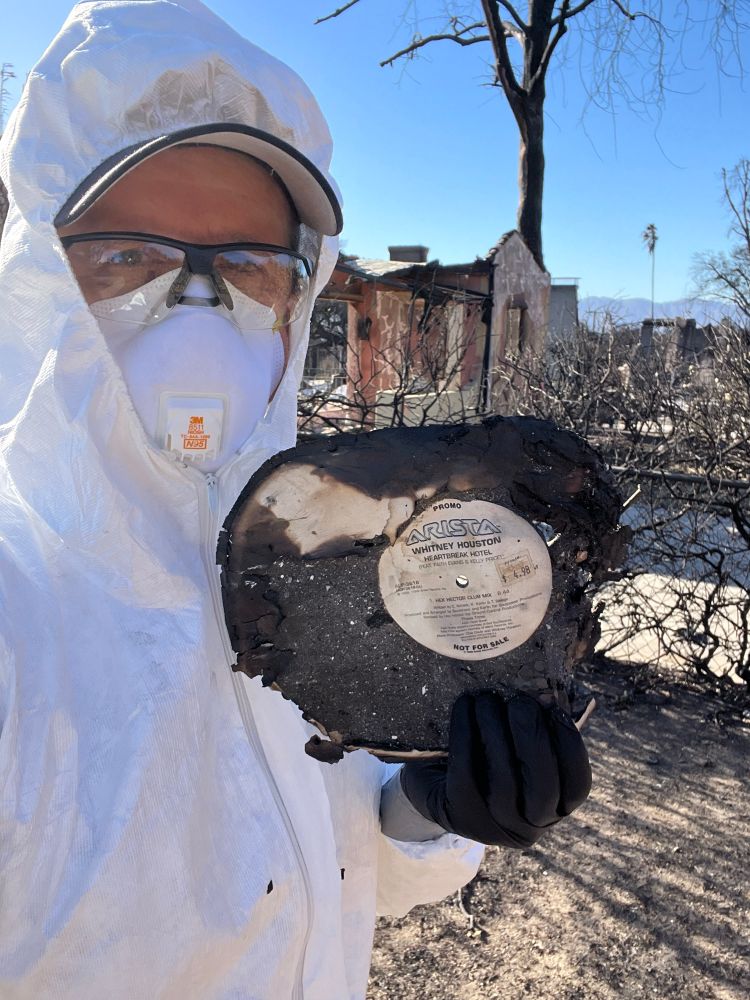
Mark Marraccini
When Jesse Kahn imagined what it would be like to be a father, he thought about music. He imagined introducing his future daughter to his favorite records.
“I’ve spent so much time envisioning sitting with her while playing music, having her grow up surrounded by artists and albums that mean so much to me,” says Kahn, a 45-year-old entrepreneur and music lover. “A part of sharing myself with her and sharing the wonders and joys of music with her.”
But those father-daughter bonding moments won’t come to pass — at least not the way Kahn had imagined them. On Jan. 7, he and his partner, Emily Davis, who was then nine months pregnant, heard wild winds blowing outside their house in Altadena, California. They could see the fire from their front door and knew it was time to evacuate. The whole household — including Davis’ children, aged nine and eleven, and several pets — escaped unharmed, but by the following morning, their house had been reduced to rubble, one of many destroyed by the Eaton Fire that devastated the Altadena area. (Friends later launched a GoFundMe campaign to help Kahn’s family.)
That’s when Kahn realized that his meticulously catalogued vinyl collection was no more. His treasured copy of John Coltrane’s Ascension that was once his dad’s? Gone. His beloved copy of Ryo Fukui’s Scenery, a Japanese jazz staple that he listened to all the time? Vanished. His original pressings of Julee Cruise’s 1989 dream-pop staple Floating Into The Night and the Bill Evans Trio’s 1961 Sunday At The Village Vanguard? Lost to the fire.
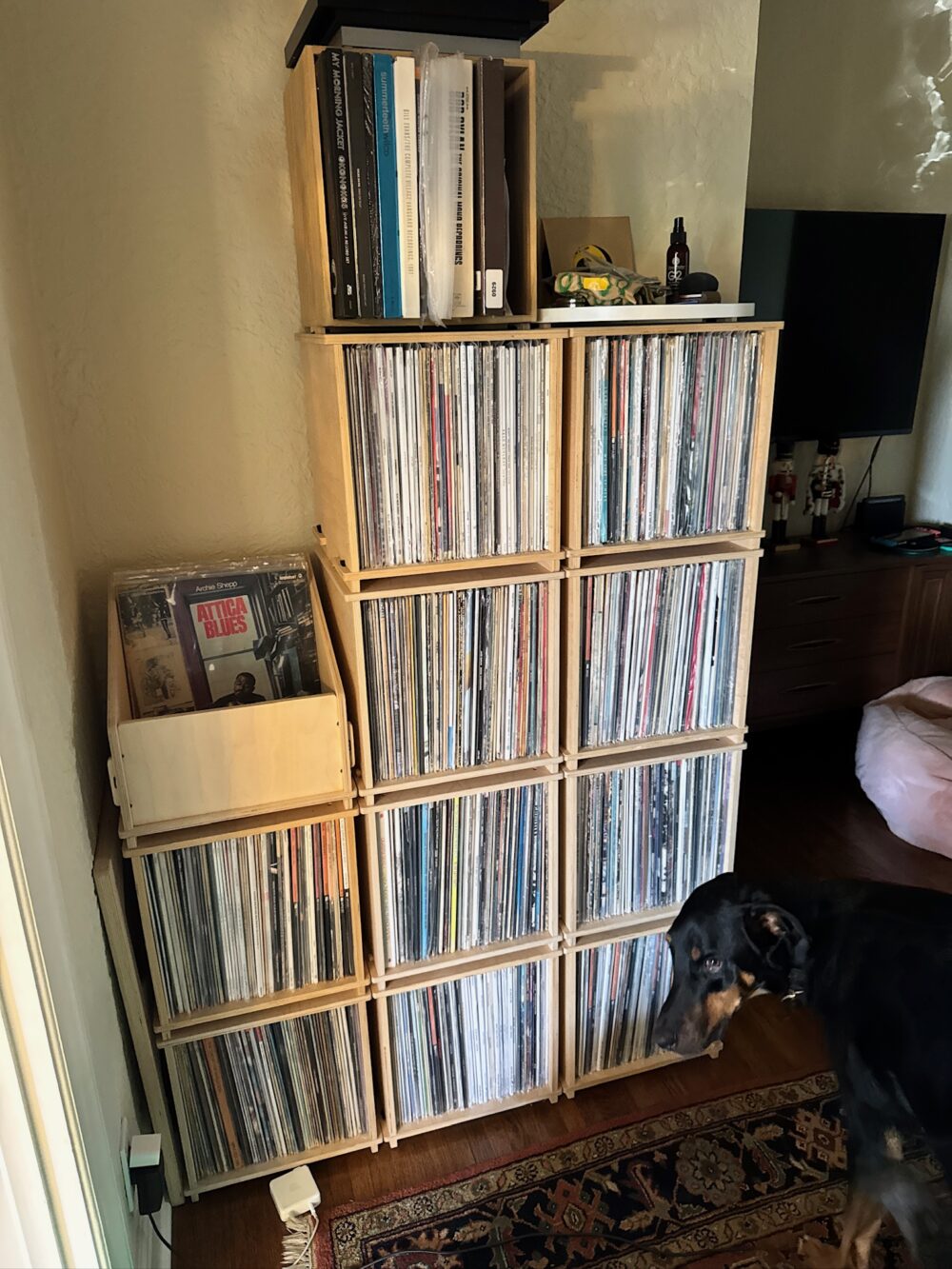
Jesse Kahn's former record collection
Kahn is one of countless Los Angeles-area music obsessives grappling with the fact that record and CD collections they spent decades accumulating have disappeared literally overnight. It may not be the most life-threatening or urgent casualty of the wildfires, but it’s a devastating blow to music fans who lost rare treasures that no GoFundMe can replace.
“It’s a loss, and I’m grieving for sure,” Kahn says. “I feel pretty gutted about it,” he adds, speaking by phone from his family’s second Airbnb of the last three weeks. “It’s a pain that I’m holding at arm’s length while more pressing things like the birth of my daughter are coming up.”
“There’s now one less of each of those in the world.”
For Kahn, records have always been a multigenerational passion. Now he’s lost not only his music collection but genuine family heirlooms, such as an old bluegrass record that his father, a lifelong musician, played on.
“I had records in my collection that were my mom’s and my dad’s, and she’ll never get that,” he says, recalling a Peter And The Wolf LP — performed by the New York Philharmonic and narrated by Leonard Bernstein — that his parents often played around the house. “I loved listening to that record when I was a kid. I just imagined playing that for her.”
Kahn grew up surrounded by records. In the early 2000s, after college, he moved to Seattle, found a few shops he liked frequenting, and began building out a collection of his own. “I kinda fell into exploring genres that weren’t really a part of the current music ecosystems,” he says. “They weren’t really readily available on streaming platforms” — soul-jazz, ’70s spiritual jazz, music that may not have become digitally available until recently, if at all.
“Collecting is a really personal journey,” Kahn says. “A record that you bought at one specific mark on that timeline — it might not be something that you listen to everyday. It might not be something that you would spend time now hunting down. But you did at one point, and it was meaningful to you at that point. So it sort of marks a memory.”
Some of those physical objects may be replaceable, but their sentimental value runs deeper. And, setting aside individual grief, the broader musical history that’s been wiped out by the fires is incalculable. Last month, the family of 20th-century classical composer Arnold Schoenberg revealed that approximately 100,000 of Schoenberg’s scores and parts were destroyed in the fires, along with historically significant photographs and letters. “We lost everything,” the composer’s son, Larry Schoenberg, told the New York Times.
Equally unlucky was Madlib, the veteran hip-hop producer and crate-digger, who lost his home, along with his recording equipment and massive record collection, in the disaster. In 2014, Madlib told Spin that he had “about three or four rooms of records,” a collection that’s been estimated around 16,000 and which was full of rare groove, funk, and jazz. That stash wasn’t just recreational; it provided the raw ingredients for the musician’s sample-driven productions, making woozy masterpieces like Madvillainy and The Unseen possible.
Though Kahn’s collection wasn’t nearly that large (he estimates around a thousand records), he is still feeling the weight of history that’s been lost. “These records are artifacts. When the original pressings, from the original stampers, are done, there’s only so many of those that will ever exist. And for what was in my collection, and the collections of others that were lost to the fire, there’s now one less of each of those in the world.”
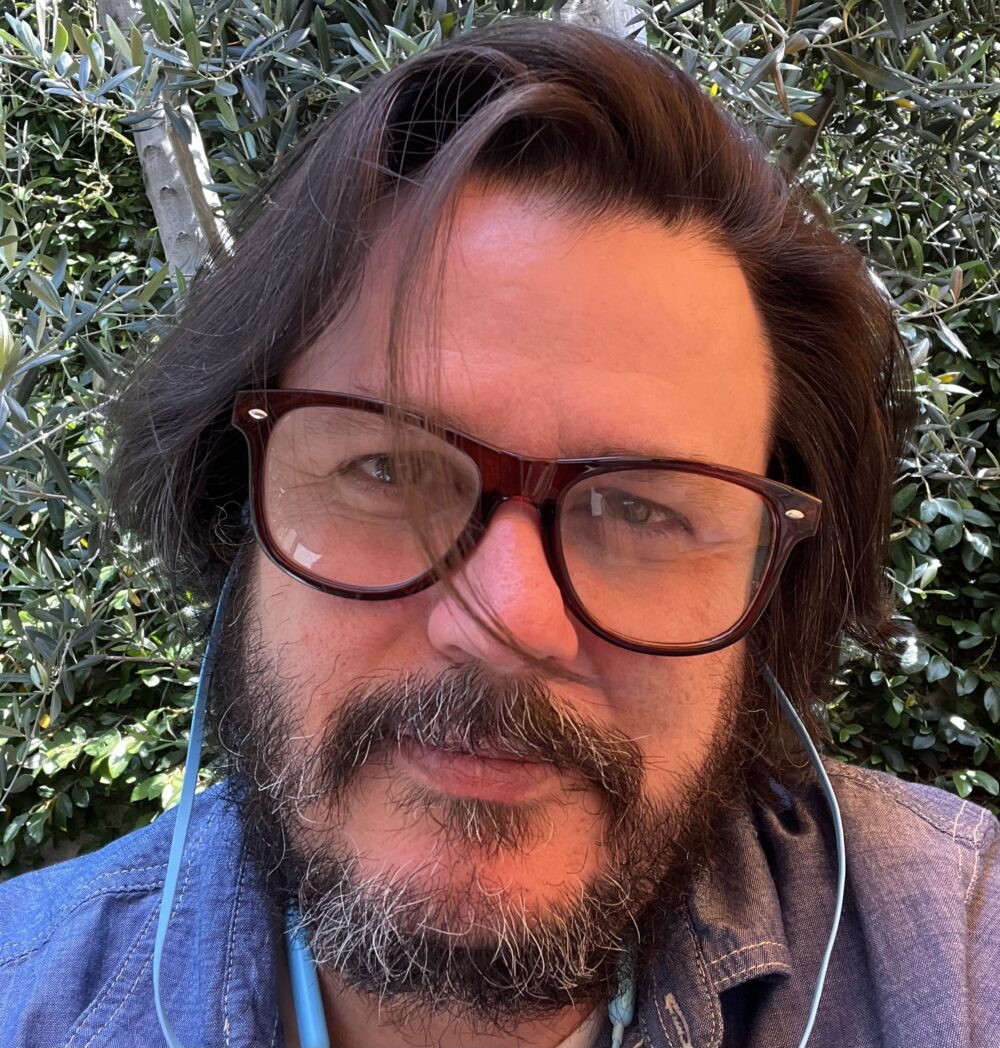
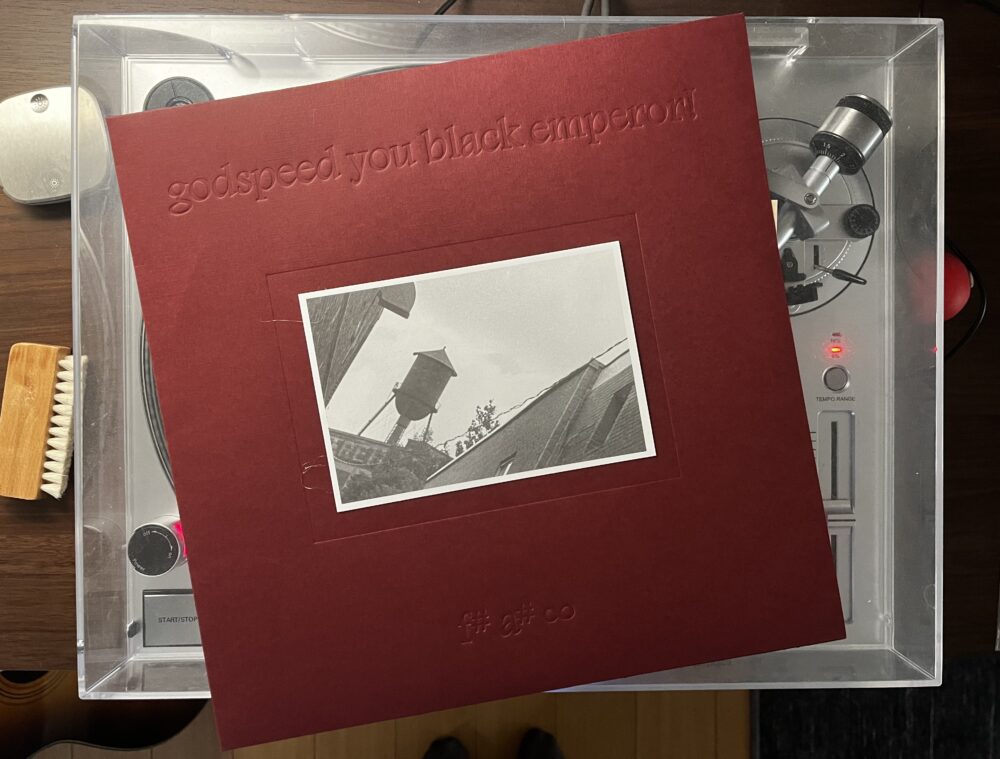
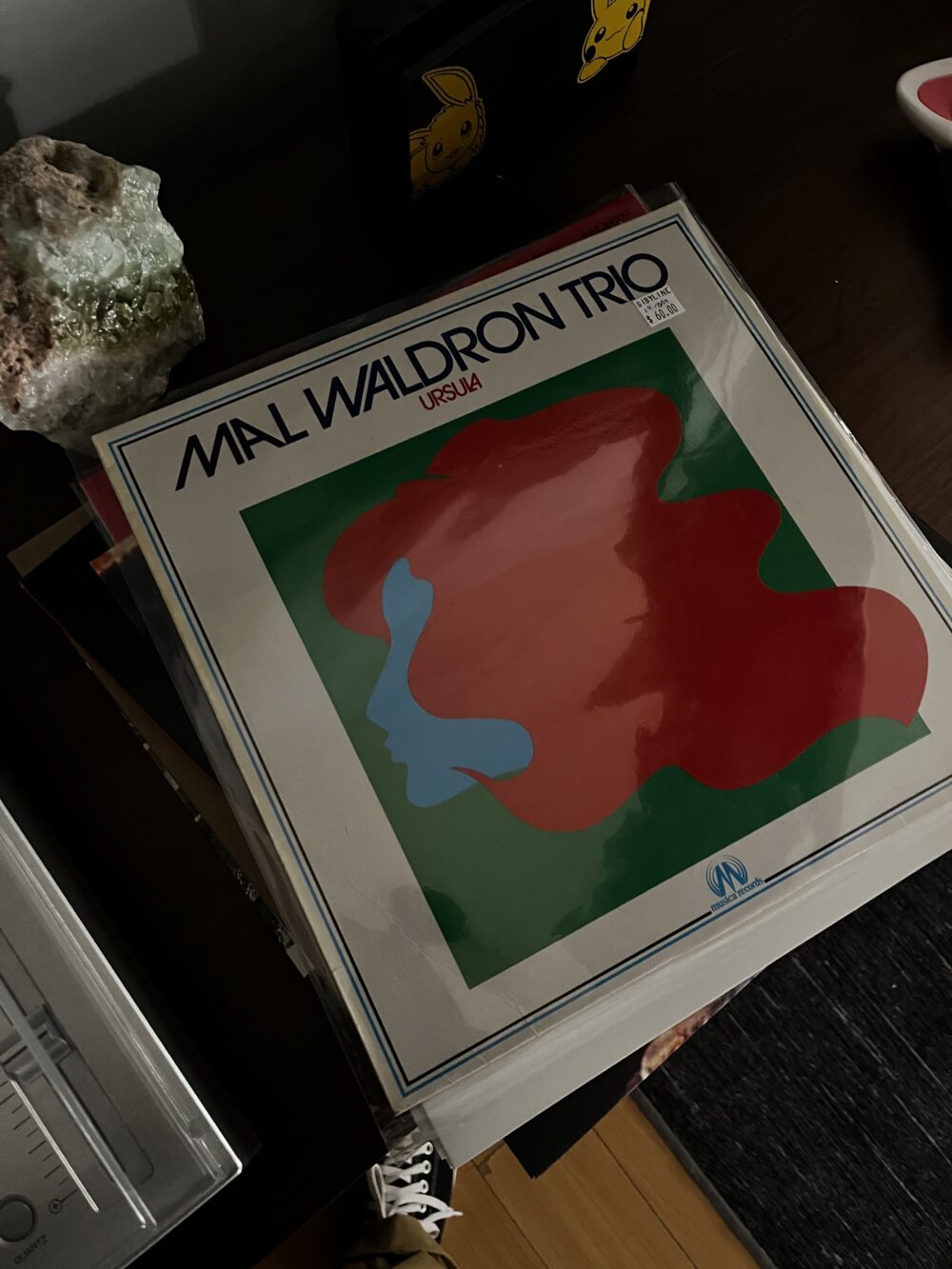
Brian Lee Clements and some of his destroyed records
“It just turned to vapor.”
For some Angelenos, losing a record collection has been not just a material loss but a blow to their sense of self. Weeks after the fires, Brian Lee Clements, a 52-year-old geologist and woodworker, finds himself wondering: “Am I still a record collector without any records? Am I still a woodworker without tools? A printer without printing tools?”
“All of those things — they’re your identity. The outward projection of who you are,” Clements muses. “And so it’s weird to not have it.”
Like Rob Gordon in High Fidelity, Clements liked to keep his collection organized autobiographically. Different sections reflected different life stages: his teenage infatuation with punk rock; his involvement with the hardcore scene in his 20s. In his 30s, he drifted away from punk and got into downtempo, and in more recent years, he filled his collection with post-rock and experimental jazz, such as fellow Altadena resident Jeff Parker, as well as LPs he bought for his nine-year-old daughter.
“People would ask, ‘Could I see your record collection?’ I would take photos of sections and say, ‘This was my teens, this was my 20s,'” Clements recalls. “At 52, new records would be added to the end of the shelf.”
That all changed on Jan. 8, when Clements lost not only his home and possessions but also his letterpress studio, his woodshop where he made custom solid-walnut furniture, and his upright piano. He was sick with pneumonia that day and believed that his home would be spared; the winds appeared to be blowing south. But at his ex-wife’s urging, he downloaded the Watch Duty app. At 3:30 a.m., he was awoken by an alert. It said to evacuate immediately.
In a state of panic, he got up and put his two cats in the truck. “When I turned around back towards the house, the whole mountains were ablaze. Just this orange armageddon in the background,” Clements says. “That’s when it really hit.”
Clements went back inside, grabbed a few important items (phone, laptop, passport, social security card), then fled to his ex-wife’s home in Pasadena. The following day, around 10 a.m., he couldn’t stop worrying about everything he had left behind. He drove back to his neighborhood, but it felt like driving through an active fire. Some homes were still ablaze. He made it a block away from his home, maneuvering through heat and thick black smoke, before needing to turn around.
At 2 p.m., he tried again. By then, the neighborhood was done burning and he was able to make it all the way to his house. It was ash, with just a couple walls still standing.
“I went right to where the records were and there was absolutely nothing,” Clements says. “I recently looked up the melting point of vinyl and it looks like it’s somewhere between 212 to 500 degrees fahrenheit. That’s where you would see it melting. And house fires, from what I’ve gathered, burn at about 1,000 degrees. The scientist in me is thinking, it went beyond melting. It just turned to vapor.”
Since the fire, Clements has been staying with his ex-wife and daughter in Pasadena; you can donate to their GoFundMe here.
“It feels like I lost a part of my personality.”
Record- and CD-shopping has always been a therapeutic hobby for Mark Marraccini. But he’s never been the type to drop wild sums on Discogs.
“For me, it’s about the hunt,” says Marraccini, an executive producer and video editor who, until last month, lived in Altadena in a house he rented with his partner. “The process of going into a store and searching is actually very therapeutic. It was like meditation, in a way, after a crazy work week.”
Marraccini’s collection — which encompassed 884 records and five fat binders of CDs — had been a work in progress since his high school days in the 1980s. He liked building out complete discographies from his favorite artists, like Cher or Barbra Streisand. A diehard Madonna fan, he had been collecting her LPs since 1983 and sometimes showed off his glorious Madonna collection on Instagram.
In 2008, when he moved from New York to Los Angeles, Marraccini had to downsize, losing part of his collection and stuffing his CDs into binders. But since then, he’s taken joy in rebuilding it. Every Friday, he liked to drive to Amoeba or Record Safari with a want list in his Evernote app. “My passion for collecting was always like a bit of a project to me,” he says. “Like, OK, I know I’m looking for this particular Everything But The Girl CD or this particular Pet Shop Boys album.”
Just recently, Marraccini found the last Everything But The Girl compilation he needed to complete that discography. “That was like an import,” he says. “It was very hard to get. I was so proud of it.”
Then, on Jan. 8 — his 17th anniversary of moving to LA — his home burned in the Eaton Fire. When he returned later that day, his beloved neighborhood in Western Altadena was just ash and rubble. “Once I got to my house and saw it, I stopped and just sobbed and just tried to understand what I was looking at,” he recalls. “I remember that when I was there, where I had this tall shelf that housed part of my vinyl collection, there were still these blue flames that were flickering in the rubble. I was like, well, that’s probably the vinyl that’s still burning itself off.”
Strangely, the only thing that survived from inside Marraccini’s house was the metal stand he used to display whichever record was on the turntable. The only records he could find in the rubble? “Heartbreak Hotel” and “Step By Step” by Whitney Houston.
I went back yesterday to the house we were renting in Altadena until we could find one to buy. The only thing that survived the Eaton Fire from inside was this metal stand I bought to show whatever vinyl album was on the turntable. Everything I couldn’t fit into a backpack and tote bag is gone. 1/2
— mark j. marraccini (@marramark.bsky.social) January 10, 2025 at 11:13 AM
It is not lost on me that the only records I found after my vinyl / CD collection burned in the Eaton Fire were “Heartbreak Hotel” and “Step By Step” by Whitney Houston. Pretty much sums everything up. #altadena
— mark j. marraccini (@marramark.bsky.social) January 27, 2025 at 12:49 PM
Though he knows others (including his next-door neighbor and her 100-year-old mother) are dealing with harder situations, Marraccini is slowly mourning all the records he lost. “I’m still trying to wrap my head emotionally around what it all means,” he says. “But it feels like I lost a part of my personality in a way.
“Someone asked me the other day, ‘Do you want us to get you a couple albums? And I’m like, ‘I don’t even know where I want to begin,'” Marraccini says, getting choked up with emotion. “It does feel like there’s a part of my personality that is being muted right now — that I’m sort of mourning and wondering what is going to take the place of that element. For me, that collection is part of my home. It’s like someone’s photo albums, those things that are home to you.”
“Here are the records that are most important.”
Since the fires, there have been some organized efforts to collect vinyl donations for people who lost their collections. On Jan. 14, Alex Rodriguez, who owns Record Safari, a store in the Atwater Village neighborhood of Los Angeles, announced on Instagram that he was putting together some boxes of records to give away and invited others to contribute.
“I keep finding myself crying over all the good stuff that people are doing,” Marraccini says, breaking down in tears over the kindness he’s witnessed. When he went out to buy new shoes and shirts, he noticed that people were donating clothing to those in need. “For someone like me, it’s hard to accept.”
Meanwhile, Scott Dudelson, a 45-year-old entrepreneur and collector who lost approximately 8,000 records when his house burned in the Palisades fire, has opened a PO box and invited anyone who wishes to mail him some records. He says he’s gotten messages and album offers from people all over the world. (The address is: Scott Dudelson, 4774 Park Granada, #8908, Calabasas, CA, 91372.)
When I call up Dudelson, he explains that he was luckier than some. He had recently moved his records from his ex-wife’s place over to his new house in Malibu. Having lived through the Woolsey Fire in 2018, he knew that fires were a looming threat. After that experience, “I made a separate section — an area of ‘Here are the records that are most important to me, most valuable, whatever I can’t readily replace,'” Dudelson says.
As it happened, those priority records were still in labeled boxes when the fire hit in January. When it came time to evacuate, Dudelson began grabbing those boxes and, with the help of his ex-wife, loading them into the car. “She managed to get through to my place before the fire department shut off Pacific Coast Highway. It was getting gnarly,” Dudelson recalls. “The fire was growing very, very quick. You could see the airplanes grabbing water from the ocean.”
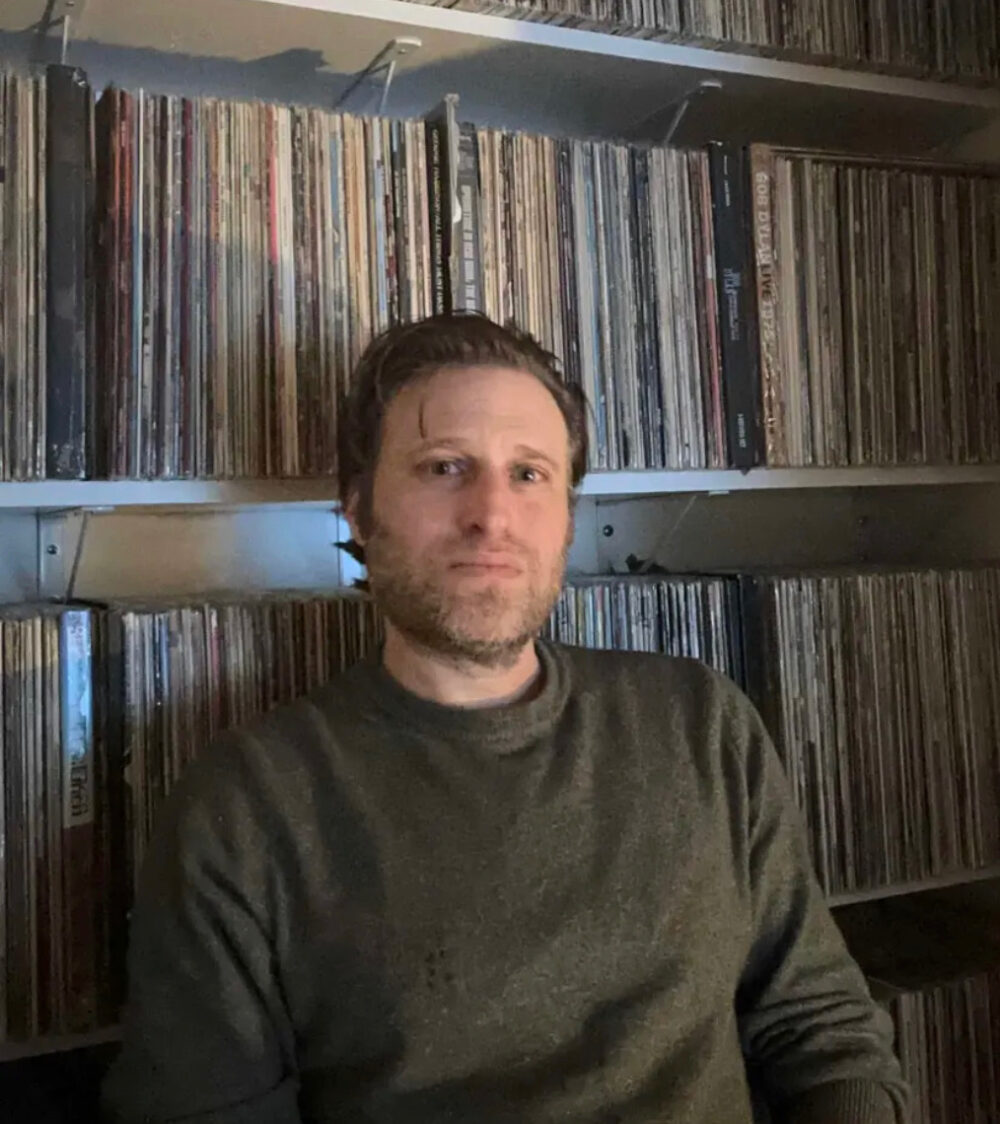
Scott Dudelson
Ultimately, he managed to save six boxes, or approximately 450 records in total. Those boxes included a mix of his favorite albums and the most expensive ones he owned: “A sealed White Album. My Cymande albums, my Brian Eno albums — I know those are in there. My Mobile Fidelity Music From Big Pink. A bunch of Neil Young box sets. Some Townes Van Zandt originals. Nick Drake originals. Really great music.”
Alas, he was not able to save the perfect copy of Reign In Blood — “original, mint, in the shrinkwrap” — that he’d copped only a month before the fires. Now it belongs to the ages.
“It’ll be a journey that starts from now.”
On Feb. 1 — one week after he was interviewed for this article and three weeks after his house burned down — Jesse Kahn welcomed the birth of his daughter. He and his partner have been playing music for the baby already. (So far, she seems to enjoy Billy Bragg and Wilco’s Mermaid Avenue.)
Of course, Kahn is still mourning his records. Streaming can’t replace “the tactile relationship that you have with the object and the ability to feel it and smell it,” he says. “It’s an actual physical needle going into an actual physical groove of a physical thing that’s spinning around in a circle. It really checks a lot of boxes in a way that streaming music just doesn’t.
“Dealing with the loss of that is really hard,” he adds. “What’ll happen instead is I’ll continue to bring music into her life and my life in new ways.”
Kahn says he’ll start to rebuild the collection eventually, although it’s hard to think about that now. He doesn’t see it as “rebuilding” so much as building anew. You can’t go back — you have to go forward.
“It’ll be its own journey,” he says. “But it’ll be a journey that starts from now rather than 25, 30 years ago.”






